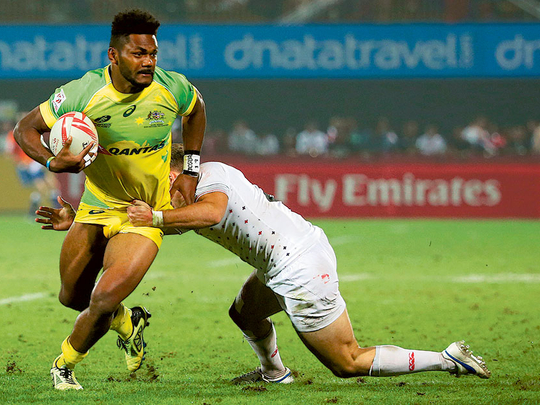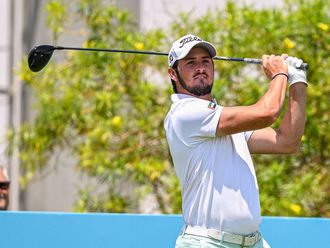
Dubai: Australia’s Henry Speight said turning his attention to sevens so quickly after the Rugby World Cup shows just how much he wants to feature in the Olympic Games next summer.
The rest of Australia’s 15s squad are getting a well-deserved rest after they reached the final of the recent World Cup in England where they lost to New Zealand 34-17 in October.
But Speight, 27, was in Dubai making his sevens debut with Australia in a bid to pick up the shorter format in time for the Olympics in Rio de Janiero, Brazil, in August.
“I wanted to come in as soon as possible to benefit myself and get learning,” said Speight. “If I had come in January I would have been chasing my tail a little bit.
“The boys have been training hard before I joined them and it’s just a real honour to be part of the group and get to know the boys and learn as much as possible from them.
“It was a pretty awesome experience,” he said of his involvement over the weekend. “My main focus coming into the tournament was to try and play and set a benchmark of what I need to work on, hopefully now it’s onwards and upwards.” The back could miss possible Bedisloe Cup involvement with the 15s if he makes the Olympics squad. But he said it would be worth it.
“I guess it’s just about taking the opportunity as it presents itself. Everyone knows the Olympics is the pinnacle of sport. It’s a dream not only for me but all rugby players. It was never a possibility before but now it is and we’ve qualified, so it can be a reality for the 14 selected.
“I’m really looking forward to the prospect of walking out in an opening ceremony. But it’s still a long way to go and there are a lot of tournaments to get through. Hopefully I can put my hand up and prove myself, we’ll see how it goes.”
South Africa also had two 15s converts among their ranks in Francois Hougaard and Juan de Jongh, and both found stark differences from the longer format.
“It’s an amazing feeling [having more space],” Hougaard said. “But at the same time you can find yourself vulnerable in defence. If you play against players with good feet who can utilise that space, it can make it so difficult.
“That is where you have to learn to adapt to the system. We have saying which is ‘you can beat the individual but never beat the system’.
“It always looks so easy when you watch on TV, it’s just a bunch of guys running around. But it is actually quite technical, if you start getting into the system.
“You get used to it, when you work as a system. All of a sudden, it is quite easy and you do not work quite as hard.”
De Jongh, who started his career in sevens, said: “I’m really excited to be back. Seven years is a long time and it’s all new again. The game has changed a little bit.
“The players on the circuit are something else and I’ve realised I have to put everything behind me.
“Every training session and match will be important and I’m not even thinking about the Olympics right now.”








